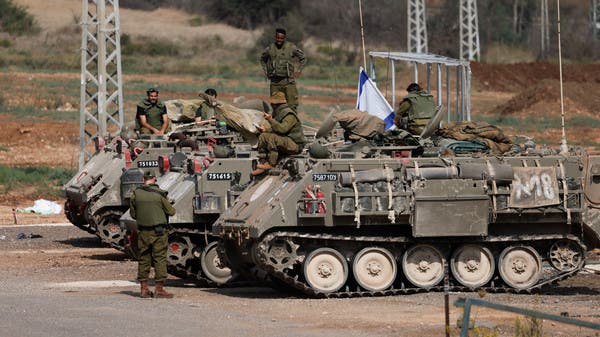Israeli forces at the Lebanese-Israeli border (Associated Press)
Middle East
Lebanese Hezbollah media said Thursday that Israeli artillery targeted border towns in southern Lebanon.
On Thursday, the Lebanese army found the bodies of two shepherds, wounded a day later in an Israeli shelling in the south of the country, according to the official national news agency, bringing the death toll since the start of the escalation to border with 66 people, most of whom were Hezbollah fighters.
On Wednesday, contact was lost with the two young men, Rabi’ al-Ahmad (20 years old) and Amjad al-Mohammed (22 years old), while they were grazing cattle near their town of Wazzani, near the border. line separating Israel, according to Agence France-Presse.
The National Agency reported that “the two young shepherds were found dead in Al-Wazzani after the occupation forces shot them” on Wednesday.
The United Nations Interim Force operating in southern Lebanon (UNIFIL) said in a statement on Wednesday evening that the Lebanese army requested its help “to evacuate two injured people near the Blue Line in the Wazzani area.”
It is stated that the Israeli army “stopped shooting to leave room” for its members and the Lebanese army to search for them, but they were not found “due to the darkness and the presence of mines in the area”.
Search operations resumed on Thursday morning. A UNIFIL spokesperson said Thursday morning that the international force had been informed by the Lebanese army that the two bodies had been found, without further details.
Media Hezbollah: Israel bombed border towns
Lebanese Hezbollah media said Thursday that Israeli artillery targeted border towns in southern Lebanon.
He said Israeli shelling targeted the outskirts of Ramia, Jabal Balat and the outskirts of Abu Laban, east of Aita al-Shaab in southern Lebanon.
Before that, the Jerusalem Post newspaper said on Thursday that the Israeli military had denied that Hezbollah had shot down its drone with a missile on the border with Lebanon.
This morning the Lebanese Hezbollah announced that they had shot down an Israeli drone with a surface-to-air missile while it was flying over the border areas with Israel. The statement added that the missile “directly hit the plane, causing it to crash and immediately fall.”
The Israeli military acknowledged that a surface-to-air missile was fired from Lebanon towards one of its marches. In a statement he said: “In response, (the army) struck the cell that launched the missile and the launch site,” without specifying who was behind the launch. He continued by stating that “no damage was caused to the procession”.
Your browser does not support HTML5 videos
Yesterday, Wednesday, an Israeli army spokesperson announced that the army bombed infrastructure and anti-tank missile launch sites belonging to the Hezbollah group inside Lebanese territory.
Captain Ella added the
The Israeli army spokesperson also said that this occurred after shelling was fired towards the Yiftah city area.
Previously, Hezbollah announced in separate statements that it had targeted the sites of Hadab Al-Bustan, Bayad Blida, the Zarit Battalion headquarters, and Israeli forces in Khallet Wardah, with artillery shells and rockets.
Your browser does not support HTML5 videos
Skirmishes and clashes are almost daily
Interestingly, since the outbreak of conflict between Israel and Palestinian factions in Gaza, following the surprise attack launched by Hamas fighters on October 7 and their infiltration of Israeli military bases and settlements in the Gaza Strip, the border Lebanese-Israeli skirmishes and clashes took place almost daily.
However, to this day it is still considered “limited” in the military sense, as confirmed by many experts.
While Israeli authorities had previously warned the Lebanese government against breaching the borders, holding it responsible for any widespread violations.
This came as many Western countries and analysts feared the possibility that the ongoing war in Gaza would expand into a larger regional conflict, in which Hezbollah would intervene with its full weight, while other groups loyal to Iran were moving in Syria and the Golan Heights, as well as Iraq and even Yemen.

